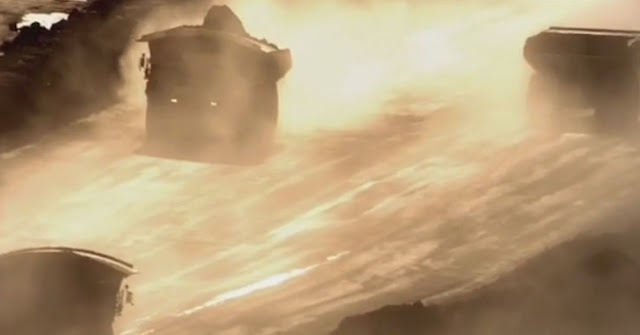 |
| Sand mining - Screenshot taken from sand-wars website |
Yesterday I watched it on Arte TV and I unfortunately can't share it with you here in English, it's in French but it's well worth watching if you can:
Combined with Climate Change, as global warming leads to the rise of the seas by an expected average of one meter, some 100 million people living on the coastlines or on islands like the Maldives will find themselves without sand (a protective barrier) and under water by...2100.
That's 100 years earlier than I predicted in my specultive fiction novel Gateway to Forever: I thought it would take longer than 85 years, but American scientists (who no doubt know better than I do) think that's how fast it will happen.
"By 2100, if you want to see a beach, you will have to turn to History books..."
That's what Denis Delestrac says in his TED talk - in English! - that you can watch here:
A way out? Perhaps using "recycled glass sand" instead of sand. That's Denis Delestrac's suggestion at the end of his TED talk. Glass bottles can be recycled to create a perfectly usable sand, even birds mistake it for the real thing and lay their eggs on it, and of course it can be used in construction just like real sand.
The trouble is that it's expensive compared to sand you find on beaches or in the sea.
The real question is: how long will it take humanity to place a price on sand? That's a job for governments, they could put on a tax, provide subsidies to recycling etc There are many policies that can be pursued to put a price on sand and make business realize how short-sighted it is in its relentless pursuit of sand-mining - literally killing the goose with the golden eggs.
Delestrac did his documentary in 2013 and talked about it on TED in the same year - have governments reacted since then?
No, not really.
Except the United Nations, and in particular UNEP, and that's very encouraging. Thumbs up for the UN staff who had the courage to put out a paper on this issue conveniently ignored by most politicians because of the huge lobbies of the sand-mining industry. Millions of dollars are at stake and big corporations won't let go.
Here's what the UNEP paper (March 2014) had to say:
Despite the colossal quantities of sand and gravel being used, our increasing dependence on them and the significant impact that their extraction has on the environment, this issue has been mostly ignored by policy makers and remains largely unknown by the general public.The paper is well worth taking a few minutes to read (14 pages), it is an eye-opener. It concludes:
Sand and gravel represent the highest volume of raw material used on earth after water. Their use greatly exceeds natural renewal rates. Moreover, the amount being mined is increasing exponentially, mainly as a result of rapid economic growth in Asia...
A large discrepancy exists between the magnitude of the problem and public awareness of it. The absence of global monitoring of aggregates extraction undoubtedly contributes to the gap in knowledge, which translates into a lack of action.Therefore, to raise this issue on the political agenda, there is a need for:
- more in-depth research
- implementation of a monitoring mechanism of aggregates extraction and trade
Anyone listening out there?
Some places are receptive. The EU, especially the Netherlands since so much of it is already "under water", is concerned with coastal management. But it apparently pursues a"sand nourishment" policy with techniques to deposit a layer of sand on the beach or seabed - even though, as Delestrac compellingly argues in his documentary, this is hardly a "final solution" as sand moves around and continues to disappear because of sand-mining. And in California, there is rising enthusiasm on the part of authorities for using "recycled aggregates" (see here).
But so far there's no global solution and the place to start doing this would be the United Nations. That 14-page UNEP paper is only a start.
What is needed is a global political will to do something about the misuse of a resource that we now know is essential to our survival on this planet.
Politicians wake up! Let's start by monitoring this issue and ask scientists to come up with solutions.
For more on the "sand wars" and the loss of sand, visit this website: http://sand-wars.com/
Comments